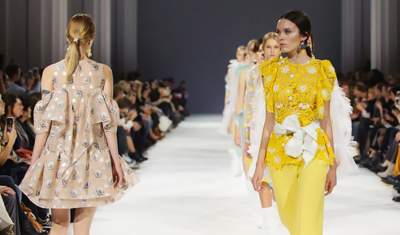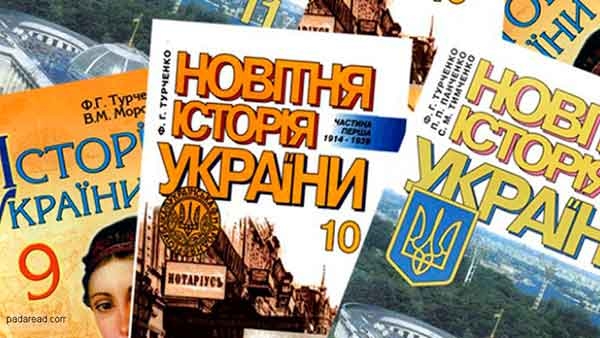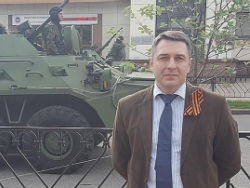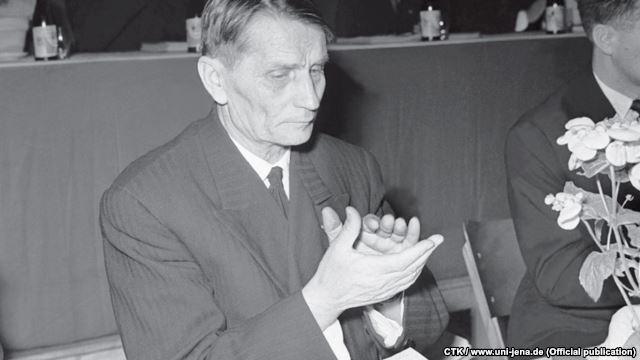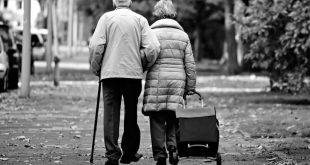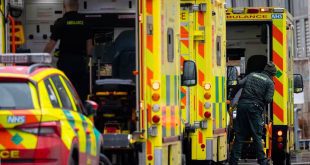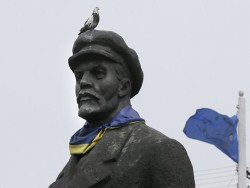
If Lenin was wrong when he decided that Ukraine should become a Federal Republic and not part of the Russian Federation? If Stalin gave Ukraine the Donbass? We were invited to the Studio Director of the Institute of national remembrance Vladimir Viatrovych.
Radio Liberty: Putin actually became a participant in the process of decommunization, which is happening now in Ukraine, because he speaks negatively about Vladimir Lenin and Joseph Stalin, as you, only on other occasions.
Volodymyr viatrovych: I think he has rather strange ideas about history, there is no holistic view about what was the history of Russia. It’s hard to say, because, on the one hand, for him the collapse of the Soviet Union the biggest geopolitical catastrophe of the twentieth century, and on the other hand, the establishment of the Soviet state now, it turns out, was a step towards the collapse of the great Russian Empire. While Putin’s rhetoric is impossible to understand which way he will choose. Putin is absolutely Imperial people most important for him is the greatness of the Russian Empire. If he’s going to see in the Soviet Union in the form of the Russian Empire, he will be talking about the great Soviet Union.
Regarding this specific statement about Lenin that he made a mistake, Lenin was forced to compromise. The fact that it is the creation of the Soviet Union as a Union of separate republics, the separation of these republics separated borders was the result, primarily, of the Ukrainian liberation movement, which was quite active in the Ukraine from 1917 to 1921. The Bolsheviks almost no other chance to stay in Ukraine but to make concessions to this movement. Concessions went even further, after the creation of the Soviet Union was still Ukrainization, which lasted until the end of the 20-ies. Only in the late 20’s — early 30-ies with the advent of Stalin began another stage Bolshevization of Ukraine, a fracture from a political point of view, from an economic point of view, the destruction of Ukrainians, especially of the peasants, the destruction of the Ukrainian Church, science, culture and so on.
Don’t you think that the Bolsheviks could go on a more rigid form of government which was proposed by Stalin?
— I think, then they just could not resist on the territory of Ukraine. This power, which rested on force of arms. Lenin knew that he must go on some compromises from the perspective of the political system and from the point of view of culture. That is, Ukrainization, which was proposed by the Bolsheviks — this was an attempt to maintain their authority.
— It may seem that Vladimir Putin is just a victim of the Soviet school and University textbooks. After all, the people who in those days taught Soviet history, it was very difficult to understand why there was Soviet Republic.
Indeed, Putin’s notion of history is very episodic, and for the most part built on the school course of history of the Soviet Union, although there are some inclusions of a new, neo-Imperial discourse, when he speaks of the Russian Empire, a greatness of Orthodoxy, and so on. In General, the concept “Russian world” is a strange combination of the Soviet world and the “great Orthodoxy.”
— The Ukrainian SSR, which emerged from the ruins of the Ukrainian national Republic — it was some kind of statehood or is it a simulacrum?
— I think, more a simulacrum, protochordata. But on the other hand, we can say that certain border, which was re-established the Ukrainian Soviet socialist Republic, in the end, played a crucial role in 1991, because these borders were re-established Ukrainian state. But even this simulacrum has played a positive role in the reconstruction of the Ukrainian state.
— The Baltic countries immediately back to the statehood that was destroyed by the Soviet occupation of 1940: and to the legal framework, and the foundations of international law. It turned out that Latvian, Lithuanian, Estonian SSR as legal mechanisms are not able to play any real role in the formation of this state. And Ukraine, on the one hand, is positioned as a successor to state that there was in the period of 1917-1920, but symbolically. On the other hand, she actually is a real successor of the Ukrainian SSR and nothing more.
— I also think that modern Ukraine has to appeal to their roots, to Ukrainian statehood in 1917-1921 years. In principle, on this occasion, there is some legislative acts: the law on the legal status of participants of struggle for independence and the decrees of the President. The last decree of the President on the centenary of the Ukrainian revolution of 1917-1921 appeared a few weeks ago.
In 1991 he held the restoration of Ukrainian statehood. We know that the first version of the act of independence on 24 August 1991 was called just “the Act of restoring the independence”, he wrote with his own hand the well-known dissident, political prisoner Levko Lukyanenko. And only through compromise and dialogue with the Communists to remove the word “recreation” and put the word “proclamation”.
— Donbass could indeed have become part of the Russian Federation, not Ukraine?
— I think not. Defining these boundaries, Lenin took into account the mood of the local population. If we’re talking about Donbass, with the exception of territories of cities and agglomerate around the mines, the territory of modern Donetsk and Luhansk regions at the time were mostly Ukrainian. Now even rural areas of the region — Ukrainian brand. Very easy to spot on the map that the power of the so-called separatists, terrorists are installed just in the part of Donbass which is the most industrialized, where most of the mines. In the North of Donbass and agricultural areas, they are exempt, are part of Ukraine.
— Stalin said about the need to increase the proletarian part of the population of Ukraine because the Bolsheviks were very afraid to be alone with peasant Ukrainian national element, which clearly supported the Ukrainian party, Ukrainian people’s Republic.
— Yes, the Bolsheviks for all time of existence of Soviet power tried to make Donbass a kind of worker’s Paradise. That is, there were heavy enterprises, mines, people worked hard, and yet there was quite a high level of social life, relatively high salaries (artificially). Therefore, after the collapse of the Soviet Union, when to maintain such a high level of social life has become impossible, for many people, the creation of an independent Ukraine in the region associated with impoverishment. That is, “independent Ukraine came out, took our money, we were doing so well in the Soviet times”. In this post-Soviet nostalgia Putin plays. That is, it actually supports not the Russians, not some other ethnic groups, and those who can be called simply Soviet people. Compact Islands Soviet remained only in the industrial Donbass and Crimea.
In the Crimea the other reason, Crimea — all-Union health resort, a resort for the party, military elites, and so on. These two regions remained compact Soviet Islands. In other regions of the Soviet values have been preserved mainly among the older generation, among those who are not active in public and political life.
— In the rhetoric of many activists and even some officials the law on the decommunization, about getting rid of Communist and Nazi symbols is slowly starting to turn into a way to audit not only the Communist legacy, the Communist era, but also the history of Ukraine of the Russian Empire. Then the little Russian provinces were part of the Russian Empire, new towns were given certain names, and it has always been perceived as a kind of tribute to history. Now I’ve seen the order of the Deputy Minister of culture about the renaming.
— On Severo-the East of Ukraine.
— Yes, this is the historical name — the southwestern road in the North-East of Ukraine. We have many more. How far can you go in that revision names?
— Removing Communist layer, we now bump into the next layer of the Russian Empire. Many people perceive a hostile reception from a return to Russian Imperial toponymy, especially in the current situation of confrontation between Ukraine and Russia, especially if we say, for example, a city such as Kirovograd, which needs to be renamed. If we talk about the return of historical names, we are talking about Elisavetgrad. But we can go even deeper and see the Ukrainian roots of this settlement, then we are talking about Ingulsky fortress troops Zaporizhzhya. We find Ukrainian roots of those or other settlements, so haven’t rightly appeal to the fact that only Russia has created there of the city, and to Russia it was a wild steppe without settlements.
— It is important to answer another question: the Ukrainian population of the Russian Empire is what? These are people who together with the Russians, the Belarusians have created this Empire, it was built, or the population of some colonized, occupied territory?
— I think we’re talking about the colonial status of Ukraine within the Russian Empire. This, of course, does not mean that it was not the Ukrainians, who participated in the leadership of the Russian Empire. In General, Russian Empire — the project is surrounded by Peter, in his creation took an active part, many Ukrainians who saw in him the more attractive global project than the Hetmanate, where they lived at the turn of XVII-XVIII centuries. After decommunization, the process of decolonization.
— Here we are confronted with a large number of the population that does not understand why it is done, because in their heads more firmly seated, this connection with history, the connection with communism.
— An important aspect of decommunization are different kind of public discussion of this issue. We launched a global public debate, the country began to talk about what is good, what is bad, evaluating the past. This never happened in Ukraine for 25 years. The first time we begin to rethink the historical experience of Ukraine.
— If one part of the country will struggle with the legacy of the Russian Empire, and the other very favourable to the legacy of the Austro-Hungarian, it will be a strange situation.
— The legacy of the Austro-Hungarian Empire in place names are practically not present. For me as a historian and as a Ukrainian Empire (Austro-Hungarian, British or Russian) is bad. As history shows, Russian is one of the worst empires in world history, but any Empire is bad. If we talk about the Austro-Hungarian nostalgia in Western Ukraine, it is present only in some commercial products, solely as an example of branding, positioning and so on.
— I understand that for Russians it is quite clear when the Ukraine refuses from communism, but when she begins to withdraw from common Imperial past, this is cause for genuine surprise.
Maybe. But I am sure that is supposedly very peaceful thesis “guys, we’re one people” we always hear from Pro-Putin and anti-Putin Russians, actually is the basis of modern warfare. After all, if we are one nation, it means that the Kremlin can decide how to evaluate those or other fragments of our past, where we integrate where to go in the future.
— Or, on the contrary, in Kiev might decide what was the history of Russia, as it should be.
— People in the entourage of Peter I, created an Empire, also thought that possibly its center is ever to be Kiev, but the history has disposed differently. I think to repeat those mistakes, to see the recreation of some of the new state with the center in Kiev is impossible. By the way, this match is another interesting trend in the Ukrainian society. Ukraine often come different kind of Russian oppositionists there who feel more comfortable, and they often heard the thesis that “Ukraine is a good democratic country, we can make it alternative Russia”. We, Ukrainians, it is of course very frustrating to hear, because it’s still Ukraine, there will be a Ukrainian state but a democratic Russia can be built only in Russia.
— Maybe just people that come to Kiev and other Ukrainian cities, especially in Eastern Ukraine, see the top layer which is very reminiscent of the life you lived in Russia?
Maybe. However, we are talking about the intellectuals, the people who, having lived here for some time, can understand what we’re talking about another people, another culture, another country.
— There are Russian historians who are more realistic are of Ukrainian statehood, heritage and realize how far separated our countries?
— Of course, there are such people. They are determined by a very simple question: whose is Crimea? The answer to this question shows how Russian historians are spared or not spared from this Imperial thinking. One of my friends and colleagues, Nikita Petrov, a researcher of the Stalin period, absolutely sober view of the Soviet and modern history. These are people working in the society “memorial” (by the way, is now widely oppressed in Russia) who fought with the Soviet system in the late 80-ies. Most of them remained in their rigid anti-Soviet and anti-Imperial positions.
— It turned out that the rejection of the Soviet legacy may lead to the resurrection of Imperial. It happened, we see the main official ideology in Russia is the ideology of imperialism. When Vladimir Putin speaks about Lenin and Stalin, he actually comes to opinions that are professed, and probably many opponents of the Bolsheviks from the whites.
— I absolutely agree with you. This is a problem of modern Russia: even among the liberal community, among anti-Putin politicians and public figures a lot of Imperials. At the same Navalny, who positions himself as the main anti-Putin politician, Imperial thinking, in fact he has nothing against the recreation of the Russian Empire. Unfortunately, in Russian history it has always been. Even during the February revolution of 1917, the forces that were willing to talk about a rebuilding of the Russian Empire, the building of a democratic state, which I quickly lost, I couldn’t resist. So their heritage is very small in modern Russia, very few people who are willing to talk about rethinking Imperial past.
But on the other hand, will finally have to be people who will explain to the Russians that Russia as the Empire had no future. World history definitely suggests that empires crumble, they don’t last very long. We have a brilliant example of the British Empire, one of the most powerful empires that has been transformed into a normal democratic state.
— You do not allow that on the territory of the Russian Federation may be some United political nation, which will unite people of different nationalities and religions?
I doubt this is possible, especially in the conditions of the policy that implements current mode.
— In Russia often say that it is impossible to establish a dialogue with Ukrainian government officials, policy makers and society, there is a stigma that not only Russian authorities, but also the Russian opposition, about which you speak. Don’t you think you should look for a compromise? Yes, the people retain some of the Imperial persuasion, however, sympathize with Ukraine, did not believe that their beliefs to prove by force of arms, tanks.
— Dialogue — it’s still a mutual respect between two actors of this process: we understand that other entity has a right to their opinion. But when the dialogue is in this vein that we are the “older brother” and have the right to teach “little brother”, this can hardly be called a dialogue. It is absolutely no matter who is a participant in this process, — Putin or anti-Putin forces.
— But in Ukraine and his own dialogue. Obviously, in the Kirovograd many would like it to be Elisavetgrad, and not Ingulsk — there is need for dialogue. But by and large the community has no opportunity to speak clearly about their own ideas about the future. If I lived in this city, I wish it was the Ingul’ska or Yelisavetgrad, but I don’t have any rights.
— For half a year in Kirovograd held countless different kinds of discussions about what should be the new name of this city. In the end, as a result of public hearings the city Council has proposed 7 names that were most popular in these discussions, and now only the Parliament, backed by one of these names, will make a decision on how will be called the city.
— You generally satisfied with the way Ukraine is run on the law?
— We need to teach the Ukrainians, in principle, to comply with any laws. The notion that the law is automatically enforced, is a pretty optimistic view. Sabotage is really happening on many levels, however, I believe that the practice of implementation of this law shows that the decommunization cannot be stopped.
But I think that it may not last as much time as appointed by law.
— I think in 2016 we get a new map of Ukraine, which will be gone over 900 names associated with the Communist past.
— Including Crimea?
— Yes. In Crimea will also be renamed human settlements, the names of which are elements of Communist symbols. We actively cooperate with the Majlis of the Crimean Tatar people, respectively, it will be about the return of historic Crimean Tatar names.
— It will be only in Ukrainian or maps can to ensure that it was on the cards, which are used in the world?
I’m absolutely sure that it will be on all maps of the world, because the absolute majority of the international community recognized the Crimea part of Ukraine.
And if Russian and Ukrainian residents of Crimea say that they don’t understand why such names: many of the people who live there, had never heard of these names, used to the fact that the Crimea is something Slavic.
— I think we will be able to conduct appropriate explanatory information.
— And on the territories that are now controlled by the so-called “people’s republics” will also be renamed?
— Of course.
Is consistent with the rights to receive people in the process of the Minsk agreements.
— The law provides six months for a different kind of civil discussions and hearings, the results of which should be taken new names. If these hearings are not held for six months, then the Crimean Institute of national remembrance, which created a special Commission of experts from the Institute of history, Institute of Archeography, Institute of the Ukrainian language, and so on, forming its position with new names. It is the name which she approves, will be submitted to Parliament.
— Can you name some of the most conflict situations related to this law?
— They relate to two regional centers. This Kirovograd, which is still a debate: whether “the Ingul’ska” — a title that supports the most creative and elite of experts-historians, whether “Yelisavetgrad” that supports the other part of this city. And this is Kiev, which the local authorities decided to leave Dnipropetrovsk in honor of the Apostle Peter. Accordingly, it will not work, since the law requires not a new interpretation of names, and a new name.
— Indeed, the majority of Dnipropetrovsk expressed for the preservation of the name “Dnepropetrovsk”?
— Yes, but if you conduct the survey, the majority of Ukrainian citizens would vote for, for example, to pay no taxes. There was an interesting discussion in the city of Illichivsk, which was proposed to rename in the Illichevsk in honor of St. Elijah, but as a result of our dialogue with the local head of government this city will be renamed in chornomors’ke.
— Chornomors’ke already exists in the Autonomous Republic of Crimea.
— Crimea chornomors’ke is not subject to the law of decommunization, because in his name there is nothing Soviet. In principle, we have precedents, when there are towns with the same name.
— You say that in 2016 this law will be almost done. But there is sabotage or resistance, and it is very easy to see, just outside the borders of Kiev. In any small village there are plenty of streets of Lenin, Dzerzhinsky, who want. What, it will all be renamed so quickly?
— Already today in towns and villages renamed, probably several thousand of the streets. This process is growing quite quickly due to the fact that on 29 October, Ukraine held local elections, which in the majority of regions, the Communists and former Party of regions lost its monopoly and, therefore, the process has begun.
— And are you not afraid that people will talk: the economic situation worsens, hopes diminish, and you are in the renaming of cities and streets?
— Renaming is to overcome the Communist past, it is also an element of reforms in the country. I understand that it will not replace the economic and political reforms, but neither economic nor political reform without overcoming the totalitarian past is also not work. The experience of countries of Eastern and Central Europe, which have undergone these processes of decommunization in the late 80’s — early 90-ies, shows that this is an essential element of the reforms, the guarantee that never again will return to the totalitarian past. Just seen on the map of the world that those countries which suffered the processes of decommunization, is already a normal democratic country, the EU, NATO and so on. In those countries where it is still not settled with a Soviet past, we have the recurrence the return to the totalitarian past is, first of all, Belarus, Russia, and until recently Ukraine.
— However, as I understand it, decommunization processes were in Ukraine and in the 90-ies.
— There were several such attempts in Ukraine behind other countries of Eastern Europe in the late 80’s — early 90-ies, when the wave of “velvet revolutions”. Then, too, they demolished monuments to Lenin. By the way, Ukraine was the most “lannesiana” country in the world. In Russia it was 6 thousand monuments to Lenin, and in Ukraine — more than 5 thousand, but if you compare the size, we understand that the number of monuments per square meter in Ukraine is through the roof. In the beginning of 90-ies some of them were dismantled, mostly in Western Ukraine, where there was an active national-democratic anti-Communist movement.
Then there was the second attempt — after the “orange revolution” in times of Yushchenko. And now this is the third attempt, which was generated primarily by the Maidan. I believe that the Maidan was even a kind of anti-Soviet uprising. After all, what did the Yanukovych government during the Maidan, is the forced return of Ukraine to the Soviet past. It caused such a strong reaction, and during the times of the Maidan, on 8 December 2013, was demolished one of the first monuments in Kiev, Bessarabka. This wave has led to the so-called “Leninabad”, which at the moment Ukraine got rid of the over 800 monuments to Lenin.

